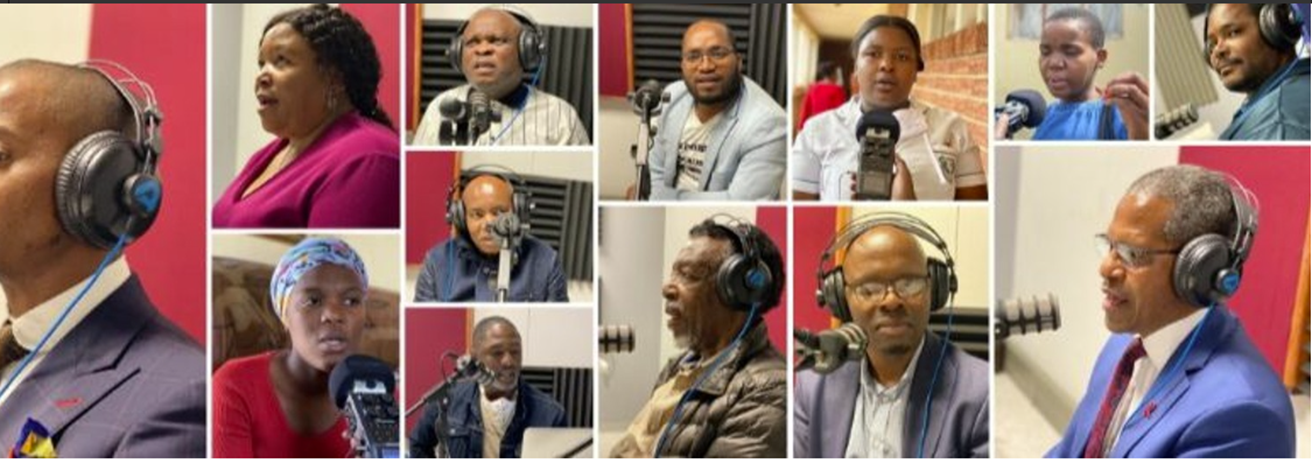
Igunundu
Going Digital
How Igunundu’s passion for creating indigenous language content is driving digital opportunities.
“Telling stories in vernacular languages is our business… in any story, language matters.”
Background
Founded in 2014, Igunundu Holdings is the umbrella company of Igunundu Press and Igunundu Agency. Igunundu Press houses its newspaper division and publishes a weekly investigative newspaper in isiZulu, Bayede News. Their in-house brand studio, Igunundu Agency, serves their newspaper as well as other companies and individuals with content development, native marketing, and podcasting. As language specialists, Igunundu Agency has combined this with their newsroom experience to deliver unrivalled vernacular content services. As Nhlanhla Mtaka, Bayede News editor-in-chief, notes, translation in the South African context does not always do the content justice because emotions are lost. Also, when supplying readers with content written in and for their own languages, they are able to grasp the context in ways a translated story would prohibit. Igunundu Agency specialises in content development and produces work in all of South Africa’s vernacular languages as well as Swahili. The agency also offers public relations services for the government because even though the majority of the country speaks isiZulu and Nguni languages, government departments still communicate to the public in English. Igunundu Agency meets these needs by offering multiple platforms such as paid content, sponsored content, and native campaigns, bringing stories to life first in print and now in digital.
“Language transcends history”
—Nhlanhla Mtaka, Bayede News editor-in-chief & Igunundu Holdings Chairman
Opportunities
“We believe that if you want to treat us as citizens, you must give us equal opportunity to understand what you are thinking so that we will be able to engage.” —Nhlanhla Mtaka, Bayede News editor-in-chief & Igunundu Holdings Chairman
From its inception, Igunundu Press recognised its global situatedness. As early as its second year, the organisation was embarking on research to understand and predict global trends, specifically in regard to digitization. They knew that the future would force them to expand into digital and instead of waiting for the tide, they rose to meet it.
The Covid-19 pandemic provided an opportunity by assisting them with the momentum they needed to convince their clients to go digital too. The first lockdown was a growth catalyst because Igunundu’s clients were forced to face this new reality. Not only were newspaper routes impacted, but news became even more of a priority, urging the digital move even further. This decision has stood the test of time from the KwaZulu-Natal (KZN) and Gauteng riots of 2021 to the KZN floods of 2022 where access to physical newspapers is often impossible and the only source of reliable news is online.
Monitoring international and local trends, Igunundu also identified the expansion of audio news. On most news sites, content is now available in audio, however, Igunundu was the first to offer audio in native South African languages.
Igundunu’s partnership with the South Africa Media Innovation Program (SAMIP) also allowed them to enhance their institutional capacity-building and provided Igunundu with a global worldview of the possibilities around technology and globalisation. The SAMIP network has also connected Igunundu to vital partner organisations locally and abroad.
Mtaka sums up the access to information barrier and opportunity succinctly when he explains, “For example, if I can’t speak English, you can give me 100 [English] books, and nothing will change for me. But if you give me one book written twenty years ago that is now available in isiZulu, to me, it’s new.” Igunundu recognised this ripe opportunity to not only capitalise on pre-existing content by recreating it in indigenous languages but also to serve the people of South Africa by giving them access to crucial information.
Challenges
“Unfortunately, digitization is still in English.” —Nhlanhla Mtaka, Bayede News editor-in-chief & Igunundu Holdings Chairman
Even though the majority of South Africans speak isiZulu, English is still the default language. However, Igunundu turns this challenge into a solution. As a promoter of indigenous languages in the media, Igunundu challenges the prevailing misconception that indigenous content is aimed at so-called lower community groups and is not viable as a mainstream medium. An anecdote to their success is their comparison to larger outlets, for example being called ‘the isiZulu Mail & Guardian’. As forerunners in their field, Mtaka says, “We came before Daily Maverick was even conceived as a newspaper. We were there. And we will be there even when they’re gone because language matters. It matters because people will define themselves better when they’re using their own language.” Even when dealing with service providers, Igunundu has had to deal with language discrimination. For example, their subscription service offers its services in multiple languages from Mandarin to French but is opposed to offering these same services in isiZulu.
One of the barriers faced by Igunundu to going digital was reluctant clients. Some were unable to see the value in going beyond standard figurehead websites in terms of both structure and budget. A core aspect of this issue was the prevalent belief of clients in the efficacy and appeal of material newspapers. However, the statistical lifespan of printed news is very short, often becoming irrelevant and discarded in just a few short hours. Therefore, Igunundu propositioned their clients to move their content to their digital platforms where they have an unlimited lifespan. They needed to not only convince their clients of the benefits of going digital but also to follow through with structural changes to allow this transformation. A champion of its own advice, Igunundu invests in its people and equipment, and systems. Team members who have been upskilled may leave to follow other opportunities, but their material infrastructure like their recording studio remains and so the organisation continues to thrive.
Solutions
By combining their passion for languages and newsroom savvy, Igunundu has been able to trailblaze what they call enterprise journalism. 70% of their press writers are first and foremost researchers who have then become journalists by the work they do with Igunundu, giving the organisation a critical edge over competitors.
Igunundu’s largest competitors are Ilanga and Isolezwe, who have each been operating for over 100 and 20 years respectively. However, Igunundu Press still launched the first-ever isiZulu subscription newsletter through Bayede News. Where other publications have long histories, Igunundu has better foresight.
Another first was the isiZulu podcast delivered for Mhlathuze Water, the second-biggest provider of water utilities in KZN. Through Igunundu Agency’s innovative methods, Mhlathuze Water was able to reach its consumers in rural areas to communicate vital information to them regarding infrastructure and services. From content development to packaging the final product, Igunundu Agency engaged directly with the population of Zululand.
A key campaign in Igunundu Holding’s digitization journey was their educational drive around the politics of elections. Instead of focussing on elections as an event, Igunundu Press and Igunundu Agency developed content on everything relevant to voters including ward committees, how wards are structured, local government, law and governance, and more nuanced aspects of politics that are usually glossed over in favour of voting drives. In fact, their communications were so successful that the Independent Electoral Commission (IEC) in KZN used Igunundu Holding’s services to deliver their own messaging. Strategically, Igunundu partnered with local community news stations Nongoma FM and Inanda FM, covering both rural and urban audiences, ensuring local languages were used to transport this essential news. Every week they published a news package that included interviews, research, and reporting on policy monitoring issues. This ensured South Africans were exposed to these topics in-depth, enabling them to make informed voting decisions.
Igunundu Agency’s investment in its own studio has also returned many dividends. As a fully-fledged podcasting studio, they assist internal organisations like Bayede News as well as external players with all their podcasting needs from pre- to post-production. Their own shows, Bayede Podcast and Igunundu Podcast, filled a vital gap in the market not served by public or private sectors. Government programming like SABC naturally creates content structured to the government, whereas private shows do the same but for commercial interests. Thus, an opportunity emerged to serve community interest. Instead of content defined by advertising or governmental programmes, Igunundu produced unrestricted and engaging stories that people were actually interested in. The studio also allows them to offer state of the art conferencing services to their clients, from video meetings to YouTube videos, also translating visual content into audio. The studio also enabled Igunundu to pivot from live broadcasting to digital podcasts, an essential move in the reality of load shedding and power cuts.
“Story-telling has always been part of African communities. Podcasting presents a unique platform not only to tell stories via audio but also to educate and engage… With our in-house studio and production teams, we produce content for our shows and bespoke branded podcasts for clients from start-ups to established corporates.” ——Nhlanhla Mtaka, Bayede News editor-in-chief & Igunundu Holdings Chairman
Once Igunundu was able to convince multiple clients of the move to digital, they also recognised a need for media buying and planning services. This ensures that their content is also aired at the most engaging times. Igunundu had also gained the country’s trust in indigenous language reporting and was the foremost source of reliable information after the death of King Goodwill Zwelithini, the monarch of the Zulu nation, in 2021. In this sense, Igunundu is shaping history with its news archives, accessible to anyone online.
Igunundu Images also offers an unrivalled specialised library of stock images relevant to South Africa. Not only improving the quality of content produced by South African outlets but also empowering local photographers and photojournalists with a platform to earn revenue and gain exposure.
Igunundu’s second passion, after languages, is its people. Mtaka focuses on the development of women and young people within the Igunundu Holdings organisations as he says these groups are more intuitive when it comes to the digital space. Igunundu has also invested in the growth of their photojournalists, growing their portfolios and capacities to include additional content creation.
Successes
Igunundu Holdings have transformed the industry narrative through language. Their passion for creating content in native languages has resulted in exponential growth—they overtake bigger competitors in terms of investigation, design, and content.
The reporting and community engagement on Igunundu Podcast around the death of 16-year-old KwaZulu-Natal teen Andile Bobo Mbuthu was unrivalled in its listenership. Thanks to Igunundu’s investigative story, published in print and digital, the documentary podcast caught the eye of Ukhozi FM, Africa’s biggest radio station. Ukhozi FM then aired the documentary podcast which was listened to by millions, giving the family and community a voice. Igunundu’s reporting exposed the links to organised crime and revealed allegations of police involvement.
The Mail & Guardian also ran their first-ever full-page isiZulu supplement thanks to Igunundu’s lobbying, proving their belief in indigenous content with its national footprint. Igunundu also provided the Mail & Guardian with two Zoom content pieces in isiZulu for them to host on their own platform.
When asked why someone should choose an Igunundu publication or service over any other, Mtaka responded that “In supporting us, you are ensuring that there is broader participation. Whether it’s news or content, you can be sure that the majority of South Africans understand your product or your issue. You are also supporting a young, independent organisation that can make an impact on access to information.”
“In this country, we have a lot of information but less access. When I say language transcends history, what I mean is that language enables you to access this information.” —Nhlanhla Mtaka, Bayede News editor-in-chief & Igunundu Holdings Chairman









